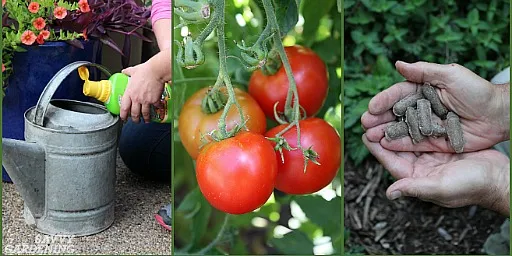When it comes to cultivating healthy and thriving vegetables, the choice of organic fertilizer plays a pivotal role. Organic fertilizers are renowned for their ability to enhance soil fertility, improve nutrient uptake, and promote sustainable and eco-friendly gardening practices.
Compost: Compost is often considered the “black gold” of organic gardening. It is rich in organic matter, making it an excellent source of nutrients. Compost provides a balanced array of essential elements for vegetables, including nitrogen, phosphorus, and potassium.
Additionally, it improves soil structure and water retention. A relatable example would be creating a compost pile in your backyard, using kitchen scraps, yard waste, and other organic materials.
2. Manure: Well-rotted animal manure is a traditional organic fertilizer that’s high in nitrogen. Chicken, cow, and horse manure are commonly used. It’s important to ensure that the manure is fully decomposed to avoid burning your plants.
Read Also: Industrial Waste and their Impact on the Environment
A relevant example is mixing aged chicken manure into the soil before planting tomatoes to promote vigorous growth.
3. Fish Emulsion: This liquid organic fertilizer is derived from fish waste. It’s an excellent source of nutrients and is particularly rich in nitrogen and trace minerals.
Fish emulsion is a fast-acting fertilizer and can be used as a foliar spray for a quick nutrient boost. A relevant example could be applying fish emulsion to leafy greens like lettuce for rapid growth.
4. Bone Meal: Bone meal is an excellent source of phosphorus and calcium, both vital for root development and fruiting in vegetables. It’s particularly beneficial for root crops like carrots and beets. A practical example is incorporating bone meal into the planting hole when setting out your root vegetables.
5. Blood Meal: Blood meal is a potent source of nitrogen, making it ideal for leafy green vegetables. It’s especially valuable if you want to encourage lush foliage growth. A pertinent example is top-dressing spinach or kale with blood meal to ensure dark, healthy leaves.
6.Seaweed or Kelp Extract: Seaweed or kelp extracts are rich in micronutrients, growth hormones, and trace elements. They enhance overall plant health and stimulate resilience against pests and diseases. A relevant application might be using a diluted seaweed extract as a foliar spray on your cucumber plants to promote disease resistance.
7.Worm Castings: Worm castings, also known as vermicompost, are a top-notch organic fertilizer. They are teeming with beneficial microorganisms and nutrients. Worm castings are perfect for improving the nutrient content of your soil and enhancing soil structure. A relatable example would be mixing worm castings into your potting mix for container gardening.
In summary, the best organic fertilizer for your vegetables depends on the specific needs of your plants and your gardening goals. Remember to conduct a soil test to understand your soil’s deficiencies and choose your organic fertilizer accordingly.
Combining various organic fertilizers can also be an effective strategy to meet the diverse needs of different vegetables in your garden.
Read Also: What Advertising Does for your Business
